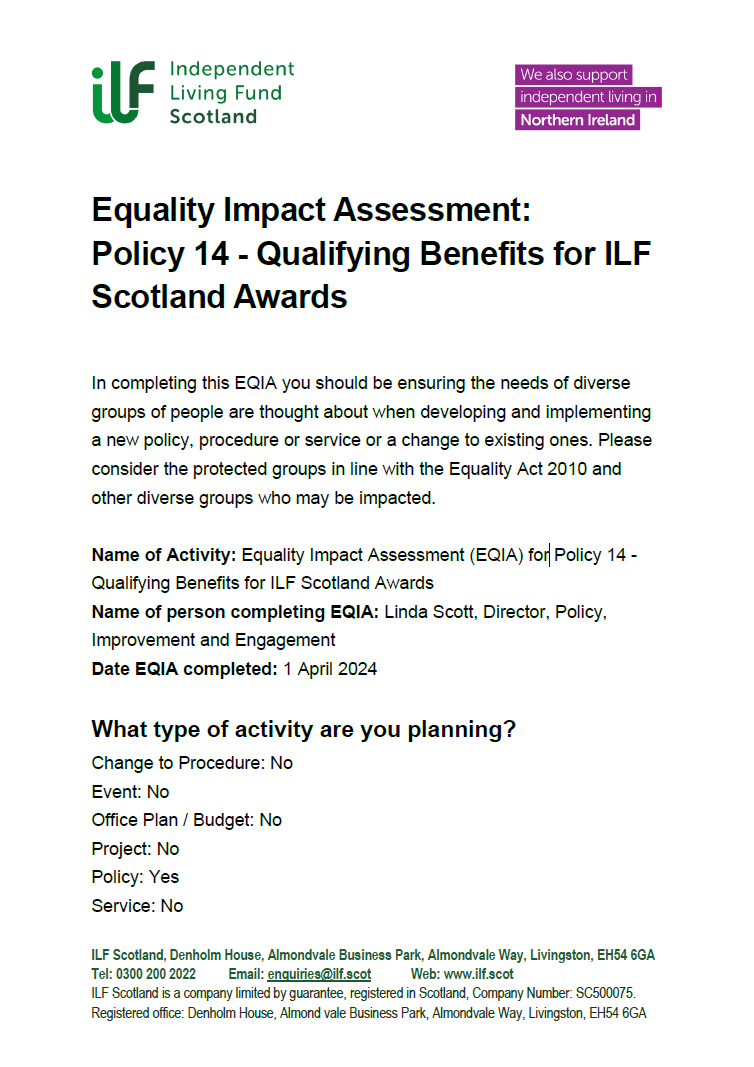
In completing this EQIA you should be ensuring the needs of diverse groups of people are thought about when developing and implementing a new policy, procedure or service or a change to existing ones. Please consider the protected groups in line with the Equality Act 2010 and other diverse groups who may be impacted.
Name of Activity: Equality Impact Assessment (EQIA) for Policy 14 - Qualifying Benefits for ILF Scotland Awards
Name of person completing EQIA: Linda Scott, Director, Policy, Improvement and Engagement
Date EQIA completed: 1 April 2024
Change to Procedure: No
Event: No
Office Plan / Budget: No
Project: No
Policy: Yes
Service: No
Change of wording to clarify that this Policy does not apply to any applicant / recipients of the 2015 Fund as of 1 April 2024.
Recipients of 2015 Fund.
The protected characteristics to consider are: Age, Disability, Sex, Race, Religion or Belief, Gender Reassignment, Sexual Orientation, Marriage and Civil Partnership, Pregnancy and Maternity. It will also be helpful to consider these groups more widely in relation to their socio-economic status that includes such factors as educational attainment, occupation, income, wealth and social deprivation.
Please mark as Yes or No. If yes use the Comments column to describe what the potential impact is. What are your sources of evidence?
(Try to think about both positive and negative impacts. There are lots of sources of data to help answer this question. Diversity Networks, the Diversity Report or Diversity & Inclusion team may offer some useful information. Previously completed EQIAs may also offer answers to questions you may have).
Age: No
Comments:
Disability: Yes
Comments: This Policy will not apply to recipients as of 1 April 2024, therefore they will not be required to be in receipt of those benefits outlined in the policy.
Gender Reassignment: No
Comments:
Marriage and Civil Partnership: No
Comments:
Pregnancy and Maternity: No
Comments:
Race: No
Comments:
Sex: No
Comments:
Sexual Orientation: No
Comments:
(For example, carer status, single parent, economic exclusion. It is important not to limit your thinking to just the protected characteristics listed above. The question is broadening the EQIA out to be more inclusive. The impact might be a negative one (e.g. making that decision could decrease the opportunity for some people to participate) or it could be a positive one (e.g. by making that decision, more people are able to take part in the activity).)
No
If there are any gaps in information that make it difficult or impossible to form an opinion on how your policy, service or change might affect different groups of people, please take the time to gather information to help you make an informed answer (for example, review statistics, survey results, complaints analysis, consultation documents, customer feedback, existing briefings submissions or business reports, comparative policies from external sources and other Government Departments etc).
The Co-Production Working Group for the re-opening of the 2015 Fund have been consulted. This advisory group includes disabled people, carers, disabled people's organisations (DPOs) and representatives of ILF Scotland, the Scottish Government and health and social care statutory partners.
Age: No
Disability: Yes
Gender Reassignment: No
Marriage and Civil Partnership: No
Pregnancy and Maternity: No
Race: No
Religion or Belief: No
Sexual Orientation: No
No
Age: No
Disability: Yes
Gender Reassignment: No
Marriage and Civil Partnership: No
Pregnancy and Maternity: No
Race: No
Religion or Belief: No
Sexual Orientation: No
Not applicable.
It is acknowledged that the re-opening of the 2015 Fund will require ongoing review and consultation. The Co-Production Working Group will continue to meet and engage with recipients and liaise with ILF Scotland on adjustments that may be required.